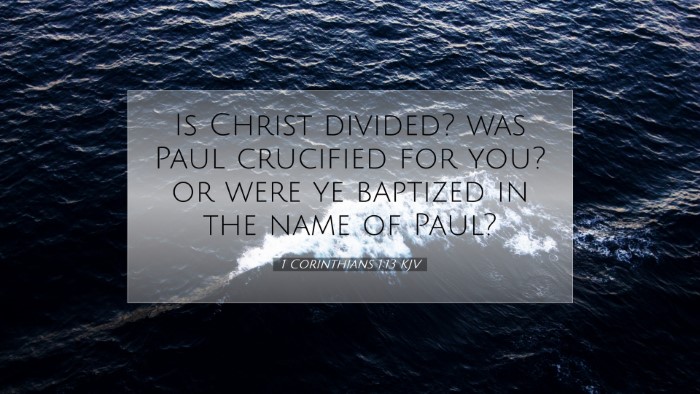Commentary on 1 Corinthians 1:13
Verse: "Is Christ divided? was Paul crucified for you? or were you baptized in the name of Paul?" (1 Corinthians 1:13)
Introduction
The Apostle Paul addresses the Corinthian church in this letter, responding to reports of divisions and contentions among them. This verse serves as a critical inquiry into the nature of these divisions, highlighting the unity that should be found in Christ rather than in human leaders.
The Nature of Division
In this verse, Paul poses a series of rhetorical questions that underscore the absurdity of aligning oneself with human leaders over Christ. The first question, "Is Christ divided?" suggests that true followers of Christ must share a common bond that transcends individual allegiance to specific leaders.
- Matthew Henry: “The Apostle Paul’s question implies that if Christ is one, His followers should not fragment into factions."
- Albert Barnes: “Paul’s reference to divisions stresses that those who claim allegiance to Christ must reject partisanship."
- Adam Clarke: “Clarke remarks on the foolishness of dividing Christ’s followers, as each faction undermines the unity of His body."
Identification with Leaders
Next, Paul inquires, "was Paul crucified for you?" This question directs attention away from human leaders to the sacrificial work of Christ. It confronts the tendency to idolize ministers and church leaders.
- Matthew Henry: “Henry clarifies that Christ alone is the Savior, and no human can claim the office of redemptive suffering."
- Albert Barnes: “Barnes argues that claiming allegiance to a leader diminishes the unique role of Christ’s crucifixion."
- Adam Clarke: “Clarke affirms that the resurrection and the work of salvation are exclusive to Christ, hence no one else should be exalted.”
Baptism in Christ
The final part of the verse, "or were you baptized in the name of Paul?" emphasizes the proper purpose and significance of baptism. True baptism is to be identified with Christ, not with human authority.
- Matthew Henry: “Henry points out that baptism signifies allegiance to Christ, and being baptized in the name of anyone else is misplaced."
- Albert Barnes: “Barnes explicates that baptism into Christ represents a commitment to His teachings and His community.”
- Adam Clarke: “Clarke notes the importance of apostolic authority in baptism, yet emphasizes that it should direct attention back to Christ.”
Implications for the Church
This verse challenges the church today to reflect on its own divisions. The spirit of rivalry and discord operates to diminish the collective witness of the body of Christ.
- Matthew Henry: “The body of Christ should be unified, and any disagreements ought to be resolved through the love of Christ."
- Albert Barnes: “Barnes asserts that unity in the church is paramount for effective mission and testimony."
- Adam Clarke: “Clarke encourages believers to seek unity while holding firmly to the essentials of the faith."
Conclusion
In summary, 1 Corinthians 1:13 calls believers to a broader understanding of identity in Christ that diverts attention from human leaders. The focus must remain on Christ's sacrifice and the unity that comes from being baptized into His name. The exhortations from these public domain commentators furnish valuable insight on maintaining unity and fidelity within the church while navigating the complexities of human relationships and leadership.


